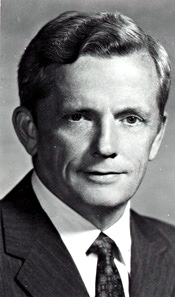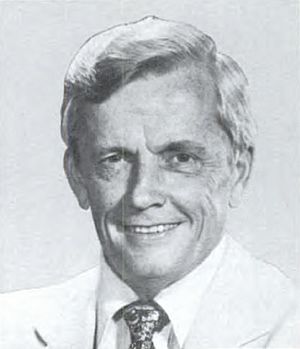Paul Findley facts for kids
Quick facts for kids
Paul Augustus Findley
|
|
|---|---|
 |
|
| Member of the U.S. House of Representatives from Illinois's 20th district |
|
| In office January 3, 1961 – January 3, 1983 |
|
| Preceded by | Edna O. Simpson |
| Succeeded by | Dick Durbin |
| Personal details | |
| Born | June 23, 1921 Jacksonville, Illinois, U.S. |
| Died | August 9, 2019 (aged 98) Jacksonville, Illinois, U.S. |
| Political party | Republican |
| Spouse |
Lucille Marie (nee' Gemme)
(m. 1946; died 2011) |
| Children | 2, including Craig J. Findley (son) |
| Alma mater | Illinois College |
| Military service | |
| Branch/service | United States Navy |
| Rank | Lieutenant |
| Battles/wars | |
Paul Augustus Findley (June 23, 1921 – August 9, 2019) was an American writer and politician. He served as a U.S. Representative for Illinois's 20th District. He was a member of the Republican Party.
Findley was first elected in 1960. During his time in politics, he supported civil rights and was one of the first to speak out against the Vietnam War. He also helped write the War Powers Act in 1973. This law aims to limit the President's power to start a war without Congress's approval. He lost his seat in 1982 to Dick Durbin. After leaving Congress, Findley helped start the Council for the National Interest. This group works to influence American policy in the Middle East.
Contents
Early Life and Education
Paul Findley was born in Jacksonville, Illinois. His parents were Florence Mary and Joseph S. Findley. He went to public schools in Jacksonville. Later, he earned his bachelor's degree from Illinois College.
Today, The Paul Findley Congressional Office Museum is located at Illinois College. It holds many important papers and items from Findley's life and political work. It is one of the few museums in the U.S. dedicated to a congressional office. Findley also served in the United States Navy during World War II. He became a lieutenant (junior grade).
Political Career Highlights
Paul Findley served 11 terms in the United States Congress. He was known for supporting farmers in his district. He was also an early critic of the Vietnam War. Findley strongly supported the Palestinians and believed in talking with the Palestine Liberation Organization. He saw them as the main representatives of the Palestinian people at that time.
Supporting Civil Rights
In 1965, Findley helped a teenager from Springfield, Illinois, named Frank Mitchell. Mitchell became the first African-American page in the United States House of Representatives since the Reconstruction Era. Findley worked with Gerald Ford, who was then a Republican leader in the House, to make this happen. Ford used one of his page appointments to name Mitchell. Findley was very proud of this achievement. He and Mitchell remained friends for many years.
Opposing the Vietnam War
Findley was one of the first to speak out against the U.S. military's involvement in Southeast Asia. In 1969, he and his team came up with a new way to protest the war. They got the Congressional Record to publish the names of all Americans who had died in the Vietnam War. At that time, over 31,000 names were listed. Soon after, anti-war groups began reading these names aloud at protests across the country.
The War Powers Act
Findley also helped write the War Powers Act of 1973. This important law was passed by Congress even after President Nixon tried to stop it. The act was created to prevent a President from sending the U.S. into war without Congress's approval.
Later Career and Advocacy
In 1982, Findley lost his re-election bid to Dick Durbin. Several things contributed to this, including a strong opponent, changes to his district's boundaries, and a difficult economy. After leaving Congress, he served on the Board for International Food and Agricultural Development (BIFAD) from 1983 to 1994.
In 1989, Findley and former representative Pete McCloskey started the Council for the National Interest. This group works to promote Middle East policies that benefit American interests.
Paul Findley's Views
Findley often spoke out about U.S. foreign policy, especially concerning Israel. He wrote a book called They Dare to Speak Out: People and Institutions Confront Israel's Lobby. In this book, he argued that groups supporting Israel, like AIPAC, had too much influence over the United States Congress. He called this influence "the 700-pound gorilla in Washington."
Some reviews of his book agreed that Israeli influence in the U.S. government was strong. Others, like a review in The New York Times, said the book was "angry" and "one-sided." They suggested it was a common reaction for a politician who felt unfairly challenged for their seat.
Findley believed that the influence of pro-Israel groups was one reason he lost his election in 1982. He also mentioned the economic recession and changes to his district's borders. He claimed that these groups worked to defeat politicians who criticized Israel.
Findley also supported the Council on American–Islamic Relations (CAIR). He believed they helped improve the image of Muslims in America. He once said that "the cancer of anti-Muslim and anti-Islamic sentiments was spreading in American society." He thought it needed to be stopped.
Criticism Faced
The Anti-Defamation League (ADL) has criticized the Council for the National Interest (CNI), which Findley co-founded. The ADL calls CNI an "anti-Israel organization." They claim it spreads negative information about Israel. The ADL also expressed concern about an article Findley wrote in 2003. In it, he suggested that U.S. support for Israel was a cause of the September 11 attacks. He wrote that "America suffered 9/11... mainly because U.S. policy in the Middle East is made in Israel, not in Washington."
Death
Paul Findley passed away on August 9, 2019, at the age of 98. He died in Jacksonville, Illinois. He was buried in Arlington National Cemetery. His son, Craig J. Findley, also became a politician, serving in the Illinois General Assembly.
Published Works
- The Transparent Cabal: The Neoconservative Agenda, War in the Middle East, and the National Interest of Israel (Foreword). 2008. Ihs Press. ISBN: 978-1-932528-17-6
- Silent No More: Confronting America's False Images of Islam. 2001. Amana Publications. ISBN: 1-59008-001-7
- They Dare to Speak Out: People and Institutions Confront Israel's Lobby. 1985, 1989, 2003 editions. Lawrence Hill Books. ISBN: 1-55652-482-X
- Deliberate Deceptions: Facing the Facts About the U.S.–Israeli Relationship. 1993, 1995 editions. Lawrence Hill Books. ISBN: 1-55652-239-8
- Abraham Lincoln: The Crucible of Congress. 1979, 2004 editions. Crown. ISBN: 978-1-885852-41-0
- The Federal Farm Fable. 1968. Arlington House. ASIN B001UCDQQW
- Speaking Out: A Congressman's Lifelong Fight Against Bigotry, Famine, and War.2011. Chicago Review Press. ISBN: 1569766258
 | May Edward Chinn |
 | Rebecca Cole |
 | Alexa Canady |
 | Dorothy Lavinia Brown |


